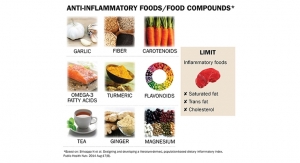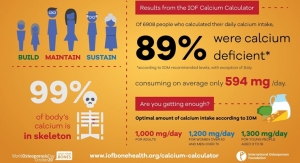12.17.12
Researchers from the National University of Singapore and the Singapore Ministry of Health have determined that carotenoids can decrease hip fracture risk in elderly, lean Chinese men. Elderly who are lean (BMI <20 kg/m2) are at higher risk of hip fracture compared to those with higher BMI.
In the study, which was presented at the IOF Regionals Asia-Pacific Osteoporosis Meeting, the researchers examined the association between dietary antioxidant carotenoids and hip fracture risk across a range of BMI in elderly Chinese men and women using data from the Singapore Chinese Health Study. This population-based, cohort prospective study recruited 63,257 men and women aged 45 years between 1993. In this group, a total of 1,630 incident hip fractures up to December 2010 were identified via record linkage with the nationwide hospital discharge database.
Importantly, the study found that low BMI is a stronger risk factor for hip fracture risk among elderly men compared to women.
Also, in men, hip fracture risk decreased with increasing intakes of total vegetables and of total carotenoids, particularly β-carotene. The protective effect was higher in lean men than in men with higher BMI. In contrast, the intake of vegetables or carotenoids had no association with hip fracture risk in women, regardless of levels of BMI.
Cartenoids, which are found many fruits and vegetables (and especially in yellow and orange pigmented vegetables) are converted to vitamin A in the body. The researchers concluded that clinical trials are needed to demonstrate the efficacy of carotenoid supplementation on reduction of hip fracture risk in elderly men. The findings may have important public health implications on hip fracture prevention, particularly among Asians.
Abstracts from the IOF Regionals 3rd Asia-Pacific Osteoporosis Meeting were published in the scientific journal Osteoporosis International.
In the study, which was presented at the IOF Regionals Asia-Pacific Osteoporosis Meeting, the researchers examined the association between dietary antioxidant carotenoids and hip fracture risk across a range of BMI in elderly Chinese men and women using data from the Singapore Chinese Health Study. This population-based, cohort prospective study recruited 63,257 men and women aged 45 years between 1993. In this group, a total of 1,630 incident hip fractures up to December 2010 were identified via record linkage with the nationwide hospital discharge database.
Importantly, the study found that low BMI is a stronger risk factor for hip fracture risk among elderly men compared to women.
Also, in men, hip fracture risk decreased with increasing intakes of total vegetables and of total carotenoids, particularly β-carotene. The protective effect was higher in lean men than in men with higher BMI. In contrast, the intake of vegetables or carotenoids had no association with hip fracture risk in women, regardless of levels of BMI.
Cartenoids, which are found many fruits and vegetables (and especially in yellow and orange pigmented vegetables) are converted to vitamin A in the body. The researchers concluded that clinical trials are needed to demonstrate the efficacy of carotenoid supplementation on reduction of hip fracture risk in elderly men. The findings may have important public health implications on hip fracture prevention, particularly among Asians.
Abstracts from the IOF Regionals 3rd Asia-Pacific Osteoporosis Meeting were published in the scientific journal Osteoporosis International.

















